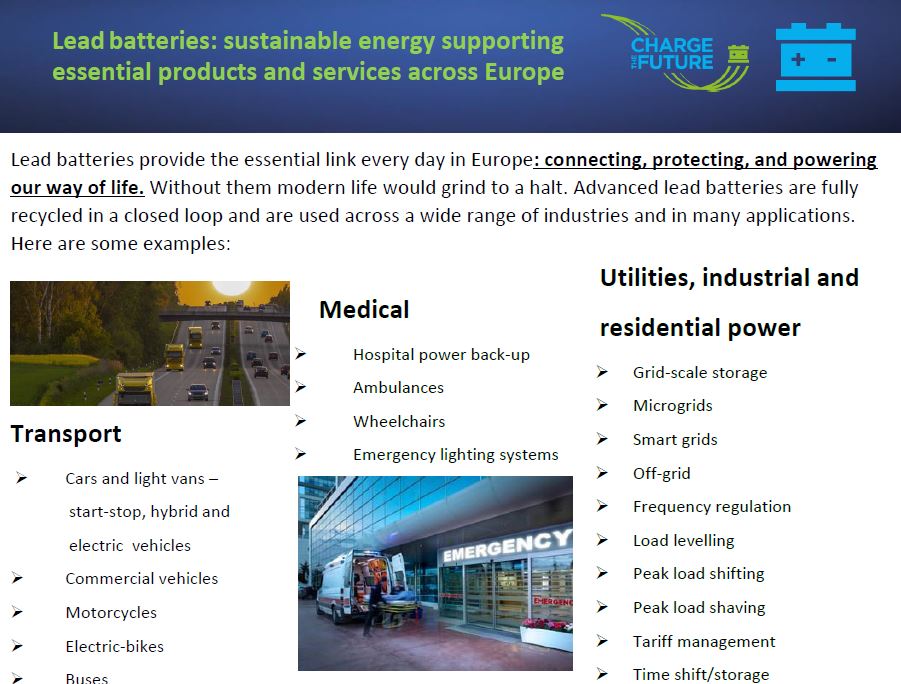Update: EU battery industry is still a critical and essential industry, guaranteeing life-saving infrastructure and services 26 January 2021

Since March 2020, the world has been facing an unprecedented health crisis with the COVID-19 pandemic. While all EU countries are in process of rolling out their respective vaccination programmes, and given further vigilance, some countries are reinforcing their restriction measures. EUROBAT members still believe that, with their products, battery manufacturers and the supply chain play an essential role in the management of the crisis, which was also confirmed by all EU governments shortly after the virus outbreak in 2020
We are still of the opinion that the battery industry qualifies as a critical manufacturing and/or essential industry that should remain in operation—on an appropriately modified basis—to provide the products and services that enable the continued operation of critical life-saving infrastructure and services. The NACE codes for these essential operations are the following:
- C27.20 - Manufacture of batteries and accumulators
- C22.29 - Manufacture of other plastic products
- C24.43 - Lead, zinc and tin production
- C20.13 - Manufacture of other inorganic basic chemicals
Batteries provide electrical power for electronic equipment, such as computers or communication equipment in hospitals and critical infrastructures until the primary power comes back online or transfers over to a secondary power source such as electric generators, which are started by batteries as well. Battery storage manufacturing, distribution, and servicing are the backbone of the backup-power storage industry.
Automotive and industrial batteries are used in mobility, energy, storage, telecom and many other applications and provide the following essential services:
- Provide backup power to life critical medical equipment such as ventilators, surgical crash carts, and defibrillators in hospitals so they can be operated even during losses of electrical power.
- Start the generators, which provide longer-term backup power for hospitals and critical infrastructure.
- Provide backup power to telecommunications equipment, data centres and internet infrastructure.
- Power the forklifts and other cargo handling equipment essential to supply chains for food, medical services and personal care products.
- Provide backup power to power station control systems.
- Start every bus and cargo truck, and are integral to the operation of trains, electric and other rail systems for public transport and goods.
- Provide power to nearly every single personal and delivery vehicle on the road, including all but a small number of electric vehicles.
- Battery recycling facilities are critical to ensuring the just-in-time supply of raw material to battery manufacturing facilities serving these critical infrastructure applications, and to prevent the unsafe accumulation of spent batteries.
The loss or reduction of the availability of batteries for any of these critical applications could prove devastating to health systems, food distribution and logistics networks, and the broader European economy in a time of dire need. We trust national governments will continue to consider the criticality of our products and industry and, as a result, will allow all our plants to remain fully operational, whatever the conditions.
Furthermore, the battery industry has already implemented health requirements such as social distancing and requiring office workers to telecommute. Our workers are already trained in proper hygiene and subject to mandatory washing procedures for the same reason.
We appreciate your attention and leadership during these difficult times.
Sincerely,
Marc Zoellner Rene Schroeder
EUROBAT President Executive Director
About EUROBAT
EUROBAT is the association for the European manufacturers automotive, industrial and energy storage batteries. EUROBAT has more than 50 members from across the continent and from the whole supply chain comprising more than 90% of the automotive and industrial battery industry in Europe. The members and staff work with all stakeholders, such as battery users, governmental organisations and media, to develop new battery solutions in areas of hybrid and electro-mobility as well as grid flexibility and renewable energy storage.
For further information, please contact us at eurobat@eurobat.org .